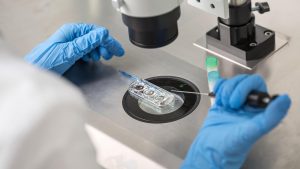When it comes to the embryo, the health of the sperm and egg even before fertilisation play an important role in embryo growth and development as well as the genetic factor.
Lifestyle factors such as smoking and drug use can influence the quality of sperm and egg, so that even if they create a genetically normal embryo, it may not be healthy enough to implant.
Uterine factors can also play a role in implantation failure. Intrauterine fibroids, lesions or polyps can affect the implantation of a healthy embryo and result in recurrent implantation failure.
There are many possible reasons why an embryo may fail to implant, however for some patients, the cause may never be known, which is why research and development into reproductive technology is incredibly important, to help increase implantation potential and to help provide answers for patients who are having trouble conceiving.






